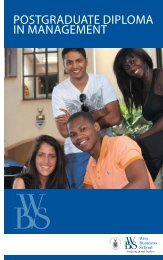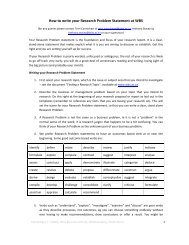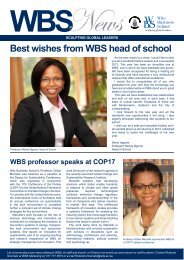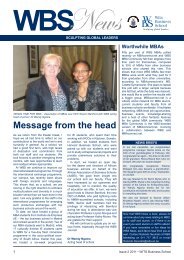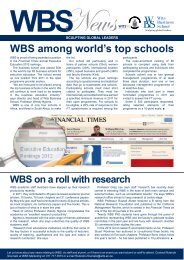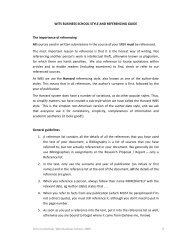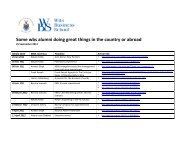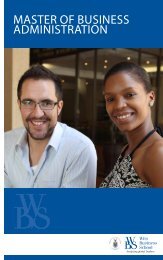Profile: professor boris urban - Wits Business School
Profile: professor boris urban - Wits Business School
Profile: professor boris urban - Wits Business School
Create successful ePaper yourself
Turn your PDF publications into a flip-book with our unique Google optimized e-Paper software.
<strong>Profile</strong>: Professor Boris Urban<br />
Prof Urban is the Acting Director of the <strong>Wits</strong> <strong>Business</strong> <strong>School</strong>. He is also the incumbent Chair in<br />
Entrepreneurship (Lamberti Foundation) at the WBS. He has more than 20 publications in leading<br />
journals, with ISI and FT listings, including: Journal of Developmental Entrepreneurship, International<br />
Journal of Entrepreneurial Behaviour and Research, International Journal of Entrepreneurship and<br />
Innovation, International Journal of Entrepreneurship and Small <strong>Business</strong>, International Journal of<br />
Innovation and Technology Management, International Journal of Human Resource Management. He<br />
has presented papers at several international conferences, and won best paper awards. Prof Urban is<br />
the series editor and author of ‘Perspectives in Entrepreneurship: a Research Companion’ published<br />
by Heinemann and Springer Books internationally, he is also co-author of ‘Entrepreneurship Theory<br />
and Practice’ published by Oxford University Press. Boris serves as reviewer for many local and<br />
international journals, and has participated on several panels as an entrepreneurship expert, including<br />
at the recent MIT GSW conference. He is a member of SAIMS and the International Council of Small<br />
<strong>Business</strong> (ICSB). He recently applied for an NRF rating, with the support of the University.<br />
Prof Urban’s signature research themes inform the research agenda of the Centre for<br />
Entrepreneurship at the WBS, and serve as a platform for research fellows and Masters/PhD students<br />
undertaking research in entrepreneurship. Boris is also the Programme Director of the Masters in<br />
Management (Entrepreneurship and NVC), for which he conceptualised six new modules, which now<br />
also serve as MBA electives and Executive Education programmes. His supervision and teaching<br />
experience is primarily positioned in entrepreneurial studies, where he has taught and designed a<br />
variety of new entrepreneurship programmes at both the undergraduate and post-graduate levels for<br />
various faculties. Prof Urban was one of the first individuals in South Africa to have completed a PhD<br />
specialising in entrepreneurship (University of Pretoria), and was awarded the Sasol prize for best<br />
PhD student.<br />
As the Acting Director of the WBS, he serves on various University committees and engages in<br />
extensive external liaisons. In this capacity and in previous managerial positions he is responsible for<br />
various management functions including finance and human relations.<br />
Apart from his academic background, Boris has extensive entrepreneurial and industry experience.<br />
He has successfully created many new ventures and has operated both as a franchisor and<br />
franchisee. He has worked for several multinational organisations in various capacities and has a<br />
broad exposure to general management in various industries. Through consulting and training he has<br />
delivered successful interventions to blue-chip clients and to the public sector, where he has had the<br />
opportunity to present his research findings to the Office of the South African Presidency.<br />
1
Assoc. Prof. Dr. Boris Urban<br />
Academic Qualifications Obtained<br />
• Philosophiae Doctor (Ph.D) Specialization in Entrepreneurship.<br />
University of Pretoria - Faculty of Economic Management Sciences -<br />
2001-awarded in 2004.<br />
Thesis Title– Investigating the moderating effect of culture and self-efficacy<br />
on entrepreneurial intentions.<br />
• Masters (Technologia) <strong>Business</strong> Administration - University of<br />
Johannesburg – Faculty of Management Completed 1997. Dissertation<br />
Title – The relevance of category management for SA retailers – a mixed<br />
methods approach. Subjects: Organisational Behaviour V, Strategic<br />
Management, Quality Management, Research Methodology V,<br />
Entrepreneurship IV. (With distinction).<br />
• Bachelors (Technologia) <strong>Business</strong> Management - University of<br />
Johannesburg (former TWR) – 4 year Degree - Completed 1989.<br />
Subjects: Management Principles And Practice I,II,III, Economics I, II,<br />
Financial Accounting I, II, Mercantile Law I, Statistical Methods, Marketing<br />
Management, Financial Management I, II, Personnel Management, EDP,<br />
Production Management (3 distinctions). Management Information Systems,<br />
Management Principles And Practice IV, Financial Accounting Aspects IV,<br />
Marketing Management, Operations Management, Cost Accounting, Labour<br />
Law, Industrial Relations, Principles Of Management Economics III, Financial<br />
Management IV, HRM, Financial Accounting Aspects IV. (With distinction).<br />
• High <strong>School</strong> Matric- Dawnview High <strong>School</strong> (JHB 1983) - Full University<br />
Exemption Pass: English, Afrikaans, Math, Science, Geography, Accountancy.<br />
Awards: Full academic honorary colours (University of Pretoria -2004)<br />
Top achiever Higher Diploma in Management – JUTA prize 1989 (TWR)<br />
Best PhD student – SASOL prize 2004 (UP)<br />
Research grant received – UJ Dept of International Affairs -2005.<br />
Accredited Trainer assessor/ moderator ETDP 581 PA 110602-f0026<br />
Educational Courses: Programme Development and Learning Guides, Effective<br />
Teaching and Learning, Assessment of Learning, Assessment Workshop (SETA),<br />
Moderation Workshop (SETA), EDLP (Web-Site Curriculum Design), Post-Graduate<br />
Study Skills Workshop, Post-Graduate Supervisor Workshop (UJ).<br />
Short courses: Situational Leadership (HBL-US), Negotiation Skills (UK), Manager<br />
Development (Prtn Grp-US), Information Management (Nielsen’s SA), Motivation for<br />
Senior Managers (MOHR-US), Project Management (PMI), Executive Development<br />
(UP), Strategic Change Management (Prtn Grp -US).<br />
2
Research Output<br />
International Publications<br />
1. Urban, B. 2006. Journal of Developmental Entrepreneurship –<br />
“Entrepreneurship in the rainbow nation: Intentions and Entrepreneurial Self-<br />
Efficacy across cultural groups”, 11 (1): 3-14. (www.worldscientific.org).<br />
2. Urban, B. 2008. International Journal of Entrepreneurial Behaviour<br />
and Research “Insights into social entrepreneurship and associated skills”,<br />
14 (5):346-364. (www.emeraldinsight.com).<br />
3. Urban, B. 2008. Journal of Developmental Entrepreneurship –<br />
“Entrepreneurship Orientation in a developing country context: Juxtapositions<br />
with South Africa’s innovation index” 13 (4): 425-443.<br />
(www.worldscientific.org).<br />
4. Urban, B. 2009. International Journal of Human Resource<br />
Management – “Cognitions and motivations for new venture creation<br />
decisions: linking expert scripts to self-efficacy, a South African study”<br />
forthcoming issue (www.routledge.com) (ISI).<br />
5. Urban, B. 2009. International Journal of Entrepreneurship and<br />
Innovation – “Competitive strategies for technology entrepreneurs: links to<br />
environmental dynamism and hostility” forthcoming issue<br />
(www.ippublishing.com) (IBSS).<br />
6. Urban, B. Barreira, J. 2009. International Journal of Innovation and<br />
Technology Management – “Empirical investigations into firm<br />
entrepreneurial orientation and technology orientation” forthcoming issue<br />
(www.ijitm.org) (IBSS).<br />
7. Venter, B. Urban, B. Kruger, S. (2009). International Journal of<br />
Entrepreneurship and Small <strong>Business</strong> Management – “Conceptual<br />
modelling of familiness transmission capital: Investigating generational<br />
succession” forthcoming issue (www.ijesbm.com).<br />
8. Urban, B. (2009). Journal of Enterprising Culture – “Serial entrepreneurs:<br />
opportunity recognition and motivators” (accepted with changes 12/7/09).<br />
Accredited DOE Publications<br />
9. Urban, B. 2006. SA Journal of Industrial Psychology – “Entrepreneurial<br />
Self-Efficacy in a multicultural society: measures and differences”, 32 (1): 2-<br />
10.<br />
10. Urban, B. 2006. Education as Change – “Entrepreneurship education and<br />
entrepreneurial intentions: a higher education perspective”, 10 (3): 14-25.<br />
11. Urban, B. 2007. SA Journal of Economic Management Sciences<br />
“Associations between entrepreneurial empowerment and reasons for selfemployment”,<br />
10 (3): 313-329. (ISI).<br />
12. Urban, B. 2007. Acta Commercii “A framework for understanding the role of<br />
culture in entrepreneurship” 7: 82-95.<br />
13. Urban, B., J. Barreira. 2007. SA Journal of Higher Education “Insights into<br />
technopreneurship: self-employment perceptions among engineering<br />
students” 21 (5): 567-583. (IBSS).<br />
14. Urban, B., J van Vuuren. 2008. SA Journal of Human Resource<br />
Management “Antecedents to entrepreneurial intentions: testing for<br />
measurement invariance” 6 (1): 1-9.<br />
3
15. Urban, B., J van Vuuren., J Barreira. 2008. Journal of Contemporary<br />
Management “High-growth entrepreneurs: the relevance of business<br />
knowledge and work experience on venture success” 5: 58-71.<br />
16. Urban, B. 2008. SA Journal of Industrial Psychology “Entrepreneurial<br />
cognitions: linking willingness and ability scripts with entrepreneurial<br />
behaviour” 34 (4): 1-9.<br />
17. Urban, B., E. Mangisi. 2008. Journal of Contemporary Management<br />
“Enterprise resource planning system implementation: investigating the<br />
process of change in medium size firms” 5: 223-237.<br />
18. Urban, B & Naidoo, R. (2009). Acta Commercii – “The relevance of<br />
operational skills towards business sustainability” (accepted with changes).<br />
19. Urban, B., Oosthuizen, C. 2009. Journal of Contemporary Management.<br />
“Empirical analysis of corporate entrepreneurship in the South African mining<br />
industry” 6: 170-192. Acta Commercii – “The relevance of operational skills<br />
towards business sustainability”.<br />
20. Urban, B. 2009. SA Journal of Economic and Management Sciences<br />
“Opportunity recognition among serial entrepreneurs: A South African<br />
perspective” forthcoming 2009 last quarter issue (ISI).<br />
Conference Proceedings Published (Refereed research papers)<br />
21. International Conference on Technology and Management – World<br />
Conference for Science and Technology- 23-26 June 2009, Paris. “Serial<br />
Entrepreneurs and Opportunity Recognition” (www.waset.org).<br />
22. Annual ICSB Conference on 22-26 June 2008 at Halifax. Nova Scotia - “Social<br />
entrepreneurship in South Africa: a SME skills perspective”. Full paper<br />
published in proceedings (www.icsb2008.org). Nominated as Best paper in<br />
theme track.<br />
23. Annual ICSB Conference on 13-16 June 2007 at Turku. Finland - “EO in a<br />
developing country context: Juxtapositions with firm success and SA<br />
innovation index”. Full paper published in proceedings (www.icsb2007.org).<br />
24. Annual ICSB Conference on 12-16 June 2006 at Melbourne. Australia -<br />
“Antecedents of high-expectancy entrepreneurs”. Full paper published in<br />
proceedings (www.icsb2006.org).<br />
25. 50 th Annual ICSB Conference on 13-16 June 2005 at Washington D.C. -<br />
“Entrepreneurial motivation: the effects of culture and self-efficacy on<br />
intentions”. Full paper published in proceedings (www.icsb2005.org).<br />
26. International SASCE Conference- 05 & 06 April 2005 at Pretoria “Developing<br />
Entrepreneurial Competencies and Capacity Building in SA Education”.<br />
Published in proceedings<br />
27. International Management Faculty Conference – June 2004 “Entrepreneurship<br />
Education at the New University Of Johannesburg. What Can We Expect?”<br />
Published in proceedings.<br />
28. University of Johannesburg - International management conference –<br />
opportunities and initiatives for the 21 st century, 29-31 Oct 2006 –“A<br />
framework for enhancing entrepreneurship”.<br />
29. <strong>Wits</strong> <strong>Business</strong> <strong>School</strong> and Centre for entrepreneurship. Conference on<br />
Entrepreneurship as a driver for firm growth, economic development and<br />
poverty reduction–presented 2 papers, Nov 2008.<br />
4
30. <strong>Wits</strong> <strong>Business</strong> <strong>School</strong> and Centre for entrepreneurship. Conference on<br />
entrepreneurship capital. Building capacity in SA. Presented 3 papers, Oct<br />
2009.<br />
Papers under review (Refereed Journals)<br />
31. SA Journal of Industrial Psychology “Empirical explorations into the nature of<br />
networking activities of SA entrepreneurs”.<br />
32. International Journal of Intercultural Relations “An ethnic analysis of<br />
networking activities”.<br />
33. Journal of World <strong>Business</strong> “Necessity driven vs. Opportunity driven<br />
entrepreneurial networking”.<br />
34. Development Southern Africa Journal - “Gender based career preferences:<br />
understanding women entrepreneurs”.<br />
35. Journal of Small <strong>Business</strong> Development – “Empirical evidence on business<br />
sustainability in South Africa”.<br />
36. SA Journal of HRM- “Evidence of technology and entrepreneurial orientations<br />
at south African firms”.<br />
37. Journal of SA Studies – “Community influences on entrepreneurial behaviour:<br />
a multi-ethnic in-group, out-group analysis”.<br />
38. International Journal of Small <strong>Business</strong> Management – “Metacognition’s and<br />
entrepreneurial intentions; a multicultural emerging country study”.<br />
Scholarly Textbooks and Chapters<br />
• H. Rwigema, B. Urban, R. Venter. 2008. Entrepreneurship Theory in<br />
Practice, 2 nd edition, Oxford University Press, South Africa: (8 x chapters,<br />
245 pages). ISBN: 978 0 19 598354 8<br />
• B.Urban (Ed). Perspectives in Entrepreneurship: A research companion -<br />
Heinemann Publishers, South Africa – Advanced Entrepreneurship HE<br />
Series. Series editor and lead author. : ISBN: 10: 0796225915<br />
• B.Urban (Ed). Book 1: Frontiers of Entrepreneurship. 2008. (3 x chapters,<br />
75 pages).<br />
• B.Urban (Ed). Book 2: The Entrepreneurial mindset. 2009. (2 x chapters,<br />
60 pgs).<br />
Referred non-accredited Publications<br />
1. Urban, B., J van Vuuren. R. Owen. 2008. SA Journal of Entrepreneurship<br />
and Small <strong>Business</strong> Management “Entrepreneurial intentions:<br />
measurement testing across ethnic groups”. Vol 1: 1.<br />
2. Urban, B. 2009. Cfe WBS Working Paper Series: Opportunity recognition<br />
among serial entrepreneurs. May Issue.<br />
Research Based Consulting Publications<br />
1. Research report with Nielsen’s SA and Sobotka Consulting (US):<br />
Strategic category analysis for Pick n Pay– BCG, SPACE matrix, etc, piloted at<br />
@12 sites in 1997.<br />
2. Research report with Nielsen’s SA and Bain International (US): FMCG<br />
category analysis for Pick n Pay– BCG, SPACE matrix, etc, piloted at @ 23<br />
sites in 1996.<br />
3. Research report on competitive industry structure – SA Retailers-<br />
supply-chain partnering – 1997.<br />
5
4. Research report - ECR category management best practices- relevance<br />
to SA retailers-policy- manual and guide for practitioners-1998.<br />
5. Research report- Franchise Entrepreneurial Partnering - intervention design<br />
and presentation to Pick n Pay franchise division -1999.<br />
6. Feasibility and viability study for Wilropark shopping centre- Roodepoort<br />
JHB store opening 1992<br />
7. Feasibility and viability study for shopping centre- Randfontein JHB store<br />
opening 1993<br />
8. Feasibility and viability study for Kelvin shopping centre- Sandton JHB store<br />
opening 1993<br />
9. Feasibility and viability study for Honeydew shopping centre- JHB store<br />
opening 1990<br />
10. Feasibility and viability study for Centurion shopping centre- PTA store<br />
opening 1994<br />
11. Viability impact study for Family Franchise Centurion shopping centre-1998<br />
12. NVC Learnership – Manual for Training excellence – Module content design<br />
and critical analysis-2002<br />
13. Eskom quality management implementation proposal- MegaWatt Park<br />
2002<br />
14. Project Management of Learnership implementation – Postnet 2002<br />
15. SMME Learnership readiness program-study skills – Achieve-Global 2001<br />
16. Study skills and learning skills for Learnership candidates -module design ITE<br />
2001<br />
17. SMME readiness – train the trainer --BEE foundation 2002<br />
18. Angloplats Learnership readiness program module design – 2003<br />
19. Centre for Small <strong>Business</strong>@ University of Johannesburg: SOWETO<br />
Campus-commissioned research projects – GEP. Financial and non-financial<br />
needs for SMMEs; Effect of Shopping Malls on SMMEs.<br />
20. Entrepreneurial assessment instrument– Educon – with Cfe Aug 2009.<br />
Subject Expert: Popular Press & Invited Media Interviews<br />
• Guest speaker on – Tim Modise show – 702 radio- SMME<br />
development (2006)<br />
• Guest speaker on – 702 radio- Entrepreneurship in SA (2007)<br />
• Guest speaker on - Alec Hogg show- Moneyweb – Entrepreneurial<br />
opportunities in SA (2007)<br />
• SUMMIT TV -DSTV - SMME youth development (2007)<br />
• Category Management a Strategic Perspective – Specialist Trade Retail<br />
Publication, Supermarket News, 2000, 34 (6), Times Media<br />
Publication.<br />
• Passion and profits, Social Entrepreneurs. Financial Mail- 2007, 23<br />
Apr.<br />
• A word from the new chair at WBS. HR Strategy, Apr 2009.<br />
• SSETA---SGB for small business.<br />
• MIT Global Start-up participant 2009 – March 25-28. Cape Town.<br />
• MIT Global Start-up – Panel member, Cultural influences on startups.<br />
• Cfe Entrepreneurship Symposium panel participant July 2009<br />
6
Lecturing Experience<br />
University of Witwatersrand, WBS Associate Prof. Jan 2009<br />
University of Johannesburg Associate Prof. Aug 2007/8<br />
University of Johannesburg Senior Lecturer Jan 2004/7<br />
Technikon Witwatersrand Lecturer Jan 2001/3<br />
Oxford Brookes University PT Lecturer Jan 1999/01<br />
University of Warwick PT Lect/Supervisor 2000-2003<br />
Milpark <strong>Business</strong> <strong>School</strong> PT Lect/Supervisor 2001-2006<br />
Modules Lectured and Curriculum Development<br />
Undergraduate Diplomas/Degrees: For BComm. (Intrapreneurship), National<br />
Diploma Entrepreneurship, BComm. <strong>Business</strong> and Marketing Management,<br />
National Diploma Art and Design (interior, multimedia), BTech Biotechnology,<br />
BTech Engineering (chemical and mechanical), BTech Optometry, BTech<br />
Emergency Medical Care, MTech Homeopathy and Chiropractic.<br />
Subjects: Intrapreneurship, Growth Strategy, Entrepreneurship, Entrepreneurial<br />
Strategy, Small <strong>Business</strong> Management, Management Practice, <strong>Business</strong> Studies,<br />
NVC, Organisational Behaviour, Strategic Management, Strategic Marketing,<br />
Research Methodology, Research Project.<br />
Postgraduate Degrees: For MComm. MBA. MM in Entrepreneurship and NVC.<br />
Subjects: Entrepreneurship Theory and Practice, Corporate Entrepreneurship,<br />
Social Entrepreneurship, Developmental Entrepreneurship, Global<br />
Entrepreneurship, Technopreneurship, Management Practice, Entrepreneurial<br />
Skills, Strategic Management, Organisational Behaviour, Research Methodology.<br />
Experiential module designs: Entrepreneurial diagnostics and selfevaluations,<br />
business plan competitions, ‘elevator pitch’ competition, collaborated<br />
on designing several case studies with WBS case centre.<br />
Extra-Curriculum modules: Entrepreneurship, NVC, Management<br />
Development, HRM, Marketing Strategy, Strategy Management, Marketing<br />
Practice, Organizational Development, Research Project, Corporate<br />
Entrepreneurship, Social Entrepreneurship, Technopreneurship, CDLP (WBS).<br />
Administrative duties<br />
Departmental Timetable Scheduling, Student Registration, Workload Distribution,<br />
budgeting, compiling accreditation reports, strategy reporting.<br />
Facilitation Evaluations<br />
Above average score (UJ reference 2006114 FARMAN URBAN)<br />
WBS (Executive programme – average score 89.1%) see attached.<br />
7
Dissertation and Thesis Supervision: Completed Supervision of higher degrees<br />
University of Warwick (UK) MBA<br />
“Managing Capacity through Human<br />
Resource Interventions”. Glenda<br />
Molope - Completed: 2002 (3 yrs).<br />
Hertfordshire University (UK) MSc (T)<br />
“Competitive advantage in a service<br />
industry environment” Gordon Shaw -<br />
Completed: 2001 (2 yrs).<br />
Hertfordshire University (UK) MSc (T)<br />
“Maintenance Management as a<br />
Strategic Competitive Advantage”<br />
Alan Berry-Completed: 2002 (3 yrs).<br />
University of Johannesburg MTech B.A<br />
“System Implementation at SAAB:<br />
Investigating Change Management<br />
Process” Edwin Mashini -Completed:<br />
2006 (3 yrs).<br />
University of Johannesburg MTech Operations Management<br />
“SMME Capacity Development”<br />
Reggie Naidoo-Completed: June<br />
2007 (3 yrs).<br />
Current supervision<br />
WBS PhD x 1<br />
MBA x 3<br />
Selected Professional Accomplishments<br />
Consulting/training<br />
Designed and delivered “World Class” category management interventions to<br />
various companies including, Cadburys, Nestle SA, National Brands, ABI.<br />
Delivered training for BEE Foundation, Venture Creation Learnership, Dept of<br />
Education, Achieve Global, ITE, Masters Research (SAMDI), Angloplats.<br />
Prepared business plans for Mugg & Bean, Pizza Perfect, Steers, BP, Caltex, Pick n<br />
Pay Franchisees.<br />
Presentations to Office of Presidency, DOE, SEDA. Member of task team of PP<br />
SMMEs.<br />
Owner of Franchise Supermarket (1999-2001)<br />
• Owner and manager<br />
• Conducted site selection and feasibility study<br />
• Turnover of R50million p/a.<br />
• Full service departments and approx 25000 SKU management<br />
• Operated with 65 staff – full financial and HR function<br />
• Complete housekeeping activities i.e. Accounts, Logistics, Marketing, etc.<br />
8
Strategic <strong>Business</strong> Manager Pick n’ Pay Head Office (1997-1999)<br />
• Developed Strategic <strong>Business</strong> Plans, in conjunction with Bain<br />
International/Nielsen’s<br />
• Analyze Categories/Brands, i.r.o market share, growth, generic strategies<br />
• Implemented tactical plans at 37 sites<br />
• Managed categories as SBU’s with Bottom Line ROI (approx R6 bn).<br />
• Designed enabling mechanisms for empowering buyers and support staff to drive<br />
business process.<br />
Franchise Developer (1994-1997)<br />
• Founder of Franchise System--100% Equity Owned in 6 x stores<br />
• Initiated franchise system and full design of manuals, training, etc.<br />
• Extensive feasibility site studies and training of franchisees<br />
• Responsible for recruiting franchisees and marketing at HO level<br />
Marketing Manager for Pharmaceuticals SA Druggists (1992-1994)<br />
Trainee Manager OK Bazaars/SAB (1987-1989)<br />
Community Service<br />
• Students in Free Enterprise (SIFE) - UJ- Faculty advisory officer 2004-6.<br />
• Franchise developer - Profit sharing schemes with employees & accumulated<br />
job creation through enterprises (approx: 120 new jobs)<br />
• Delegate to HIV/AIDS HESA conference – Grant application proposal-2008-<br />
JHB.<br />
Academic Citizenship<br />
• Reviewer –SA <strong>Business</strong> Review, SA Journal of Economic Management<br />
Sciences, SA Journal of Industrial Psychology, SA Journal of Human Resource<br />
Management, Acta Commercii, Journal of Small <strong>Business</strong> Management,<br />
Journal of Developmental Entrepreneurship, International Journal of<br />
Entrepreneurial Behaviour and Research, ICSB conference paper reviewer<br />
• External examiner/moderator/critical reader for PhD/ M Phil Thesis<br />
and Dissertations, entrepreneurship modules (University of Pretoria), MBA<br />
(UK), dissertations/exams – Milpark <strong>Business</strong> <strong>School</strong> (MBA), Oxford Brookes<br />
University - Strategic management, Change management, <strong>Business</strong> ethics,<br />
Research Methodology (University of Johannesburg, University of Pretoria,<br />
UNISA).<br />
• WBS panel chair and member – research proposals panels x 8 (2009)<br />
• Conceptualised the 2009 WBS Cfe 2 nd Annual Conference<br />
Academic Leadership<br />
Institutional level:<br />
• Member of the Senate Academic Ethics Committee 2007/8: University of<br />
Johannesburg.<br />
• Member of the Strategic Task Team during the RAU and TWR merger<br />
2004. Entrepreneurship Centre Development at SOWETO campus.<br />
• SAIMS 2007 conference organising committee member<br />
• WBS Centre for Entrepreneurship Board Member 2009.<br />
9
Faculty level:<br />
• Member of the Faculty Board in the Management Faculty University of<br />
Johannesburg 2004-2008.<br />
• Faculty Chairperson for Ethics committee University of Johannesburg<br />
2007/8<br />
• Faculty representative for ethics and research committee University of<br />
Johannesburg 2007/8<br />
• Status committee– applications for further study, University of<br />
Johannesburg 2006/8<br />
• Member of the Faculty Research Committee University of Johannesburg<br />
2006/8<br />
• Member of the Faculty Higher Degrees Committee University of<br />
Johannesburg 2006/8<br />
• Member of the Faculty Board in the Commerce, Law and Management<br />
Faculty University of Witwatersrand 2009<br />
• Member of the Academic Planning Committee in the Commerce, Law and<br />
Management Faculty University of Witwatersrand 2009<br />
• Member of the Staffing and Promotion Committee in the Commerce, Law<br />
and Management Faculty University of Witwatersrand 2009<br />
<strong>School</strong>/Departmental level:<br />
• Departmental representative, Library committee Department of<br />
Entrepreneurship University of Johannesburg 2006/8<br />
• Open day speaker, Department of Entrepreneurship, University of<br />
Johannesburg 2006/8.<br />
• Benchmark study on entrepreneurship: Department of Entrepreneurship,<br />
University of Johannesburg 2008.<br />
• Acting Head Department of Entrepreneurship, University of Johannesburg<br />
2007/8<br />
• Subject Head for Entrepreneurship Department of Entrepreneurship,<br />
University of Johannesburg 2006/8<br />
• WBS BEE Barloworld awards 2009- Working committee member and<br />
Research consultant.<br />
• Chair of the WBS/Barlowworld programme committee 2009<br />
• Deputy Director WBS 2009 July<br />
International Visits<br />
• NYU-Stern <strong>Business</strong> <strong>School</strong> (US)<br />
• Columbia University (US)<br />
• Sydney University (Australia)<br />
• Australian Catholic University(Australia)<br />
• Turku University (Finland)<br />
Biographic Details<br />
• Age 43 – Male<br />
• Born - 1965 in Subotica (Eastern Europe) Full SA citizen since 1983.<br />
• Reside in Lonehill, Sandton for past 12 years<br />
• One dependant- son (15 years)<br />
• Languages – English (excellent), Afrikaans (fair), Slavic (good),<br />
Yiddish (basic).<br />
10
Referees<br />
1. Dr J. Barreira (PhD, Entrepreneurship -UP)<br />
Investment entrepreneur; CEO of General Manufacturers Alberton; part-time lecturer at University<br />
Johannesburg and MPBS in Entrepreneurship and Research Methodology.<br />
genhinge5@global.co.za<br />
Long-term colleague<br />
Part of academic community<br />
Researcher and practioner in entrepreneurship in organisations, technopreneurship, and<br />
entrepreneurship orientation.<br />
2. Prof M. Pretorius<br />
Faculty of Economic and Management Sciences, University of Pretoria<br />
marius.pretorius@up.ac.za<br />
Part of academic community<br />
Researcher in entrepreneurial motivation and culture, entrepreneurial failure and learning.<br />
3. Prof J Luiz<br />
WITS <strong>Business</strong> <strong>School</strong>, Parktown, Jhb<br />
International Programmes Director, University of the Witwatersrand<br />
John.Luiz@wits.ac.za<br />
Co-worker<br />
Research in entrepreneurial economics and development entrepreneurship<br />
4. Dr G. Shaw (PhD)<br />
Chair in Entrepreneurship at University of Fort Hare<br />
gshaw@uj.ac.za<br />
Ex-business partner<br />
Co-worker<br />
Practioner and researcher in entrepreneurship finance and entrepreneurial tourism<br />
5. Prof M. Ncube<br />
Prof. Mthuli Ncube, PhD (Cambridge, UK)<br />
Director and Head of <strong>School</strong><br />
& Professor of Finance<br />
<strong>Wits</strong> <strong>Business</strong> <strong>School</strong><br />
University of the Witwatersrand<br />
E-mail: Mthuli.Ncube@wits.ac.za<br />
Promoter of Chair in Entrepreneurship at WBS<br />
6. Prof. Jurie van Vuuren<br />
Coordinator: Chair in Entrepreneurship<br />
Faculty of Economic and Management Sciences<br />
University of Pretoria<br />
Jurie.VanVuuren@up.ac.za<br />
My supervisor for PhD studies<br />
Many publications in entrepreneurship training, entrepreneurial culture, entrepreneurship education<br />
11
Other University Contributions:<br />
Research capacity development.<br />
While at the University of Johannesburg I initiated to have a department for entrepreneurship<br />
established at the University. To support my proposal I conducted a benchmark study at Dean’s<br />
request to position Department of Entrepreneurship in the broader higher education research<br />
landscape.<br />
Based on these proposals the establishment of department was approved by the University Senate<br />
(2004). The Department of Entrepreneurship was set up to collaborate and co-exist with the Centre<br />
for Small and Medium Enterprise Development (CSMED) at the SOWETO campus of University of<br />
Johannesburg. Since the establishment of these departments, extensive research and training has<br />
taken place in line with the CSMED mandate to assist SMMEs to grow in the SOWETO area. Various<br />
research projects have been commissioned for clients such as GEP. Collaborative links have also<br />
secured nation wide training of entrepreneurs for TECHNO-SERVE.<br />
I was the University of Johannesburg delegate to HIV/AIDS HESA 2007 conference – to assist with a<br />
grant application proposal.<br />
In 2004 I was appointed as University faculty advisor for Students in Free Enterprise (SIFE) global<br />
initiative. Several projects to assist micro enterprises were co-supervised with students who have<br />
since competed annual in the SIFE awards.<br />
I serve on the task team in the Office of the President in terms of integrated SMME support for public<br />
procurement policy.<br />
I have collaborated in my capacity as series book editor with project director at the World Institute for<br />
Development Economics Research (WIDER) of the United Nations University.<br />
12
Brief description of completed research:<br />
I first present a brief quantitative analysis of my research outputs which have been calculated in<br />
accordance with Department of Education criteria for reporting completed research. I focus here on<br />
the period 2006 to 2008, where the bulk of my research has taken place. For 2006 a total of 3, 5 units<br />
were allocated to the University of Johannesburg on the strength of my submissions. For 2007 a total<br />
of 3 units were allocated – as one of my papers was co-authored. For 2008 I have calculated 4.5 units<br />
which exclude the co-authors allocations.<br />
In summary, total research output was 11 units (12 articles and 3 conference publications) for this<br />
2006 -2008 period.<br />
My research has focussed exclusively on entrepreneurship, where entrepreneurship is at the core<br />
of the investigation and is not a peripheral topic. Although a wide range of topics have been<br />
investigated, the nature of my research reflects the fragmentary nature of this new field of<br />
entrepreneurship. Based on the relative dearth of research on entrepreneurship available in South<br />
Africa (no accredited journal currently exists dedicated to entrepreneurship, whereas internationally<br />
there are more than 40 peer reviewed journals specialising in entrepreneurship) my work has tried to<br />
capture some of the rigorous research evident in this growing field of entrepreneurship. The<br />
overarching goal with all my research is that the content and methodologies are based on sound<br />
scientific research and not popular management theory literature.<br />
Each of my papers reflects specialised knowledge in entrepreneurship, where systematic theory and<br />
an established body of literature are accessed to contextualise the research in the prevailing South<br />
African socio-economic milieu.<br />
My approach is to provide a knowledge based narrative at the outset of each paper, thereby adding<br />
relevance and providing clarity with a structured overview on the particular entrepreneurship theme<br />
under investigation. The majority of my research is based on a positivistic epistemological stance with<br />
a quantitative methodological approach where I use scientific methods to collect data and formally<br />
test hypotheses. Due to the lack consistent, comprehensive and detailed data on entrepreneurs in<br />
South Africa, my research provides a systematic approach in developing theory and testing<br />
assumptions about the entrepreneurial activity in South Africa. The descriptive nature of these studies<br />
allows for data on different facets of entrepreneurship to start accumulating. The blend of theoretical<br />
and empirical evidence emanating from the papers, demonstrates the convergence of thinking on a<br />
particular topic.<br />
Over the years my research has not focused on the macro-perspective of entrepreneurship, but rather<br />
because of the diversity of entrepreneurship evident in South Africa, i.e. opportunity vs. necessity,<br />
informal vs. formal, my studies using relatively small samples (80-300), focus instead on these<br />
differentials. I consider large data sets and national surveys far too mechanistic, and rely instead on a<br />
thematic and focused approach more suited to capture the complexity of entrepreneurial involvement<br />
by diverse individuals in wide range of sectors, industries and contexts.<br />
My paper on entrepreneurial education, as a prospect for higher education investigates<br />
entrepreneurship as an academic discipline and participation in entrepreneurial studies is examined<br />
by comparing different countries and institutions, which is interpreted in terms of various pedagogical<br />
perspectives. Consolidations illustrating the current state of affairs in terms of entrepreneurship<br />
offerings at local higher education institutions are supported with a survey. Because the field is still<br />
evolving in terms of ontology, a multi-disciplinary approach towards studying entrepreneurship is<br />
recommended, where a shift in paradigm from traditional management to entrepreneurial thinking is<br />
emphasized. One of the implications of this study is that entrepreneurial education is an emerging<br />
field that must create its own ontological and epistemological base.<br />
Based on classical and contemporary readings, I investigated social entrepreneurship to elucidate just<br />
how pervasive entrepreneurship is in different fields and can create value for profit and non-profit<br />
organisations. In this study, empirical findings were interrogated in the context of existing research<br />
and comparisons with UK Social Entrepreneurship Activity (SEA) rates were made. This was a first<br />
where SEA and skills were empirically derived and measured. This initial South African interrogation<br />
advances the topic where it has much relevance, in terms of the nation’s huge social deficit.<br />
Reflecting on global competitiveness scores and indices, South Africa’s innovation index was<br />
interpreted in the paper on corporate intrapreneurship. The findings of this study suggest that<br />
13
entrepreneurial orientation (EO) is positively associated with overall firm performance and the<br />
significance of the study emerges when links with South Africa’s innovation levels are made. This<br />
study is relevant when considering that for businesses based in Africa, the challenge to participate in<br />
the global economy of the 21 st century will be to compete as world-class businesses where the focus<br />
is on high-value added human capital based on creativity and innovation.<br />
Infusing an enterprising spirit into student endeavours and the promotion of entrepreneurial skills has<br />
been implemented worldwide as an impetus to promote “technopreneurship”. My study on insights<br />
into technopreneurship empirically investigates entrepreneurial perceptions among non-business<br />
students before and after exposure to an entrepreneurship intervention. Results emerge which<br />
generally indicate a significant increase in self-employment intentions. The study is significant in<br />
response to South Africa’s insidious skills shortages, where embedding entrepreneurship education<br />
within non-business studies is highly recommended and requires flexible and collaborative<br />
implementation.<br />
The focus of my article on entrepreneurial empowerment is based on the individuals’ perception of<br />
business start-ups. This investigation is relevant in South Africa, where empowerment is not only<br />
widely advocated, but where there is a need to empower individuals to have the potential to be<br />
entrepreneurs and to do this entail fostering empowerment amongst individuals (especially for sectors<br />
of population such as women and previously disadvantaged groups who could be perceived as<br />
lacking entrepreneurial traditions) by increasing perceptions of self-efficacy. The significance of this<br />
investigation reveals that the psychological component of empowerment is pivotal. Building on the<br />
conceptual foundations of understanding the role of individuals in venture creation, it is imperative that<br />
policymakers recognise how individual intentions make things happen through ones own actions. The<br />
entire entrepreneurial process unfolds because individual entrepreneurs act and are motivated to<br />
pursue opportunities.<br />
Building on the theme of self-efficacy I bring the concept of cognitive expert scripts to bear upon the<br />
venture creation decision and following a script-scenario construction model the existence and degree<br />
of mastery of scripts is inferred from a selection of items consisting of paired script recognition and<br />
distracter cues. With advances in social psychology and specifically in the area of social cognition,<br />
this now allows for entrepreneurship investigators to address the think-doing connection of<br />
entrepreneurs more directly. Examining entrepreneurial cognition in a multicultural society is pivotal to<br />
understanding entrepreneurial behavior, as little evidence exists that cognitive patterns and behaviors<br />
are salient to entrepreneurs from non-Western cultures. By devoting attention to how expert<br />
entrepreneurs think in an emerging market context the article makes a contribution in understanding<br />
and assisting in the development of entrepreneurs as expert professionals. This interrogation of the<br />
entrepreneurial mindset, within an emerging economy, has both theoretical and practical relevance<br />
where the article sheds light on the content and structure of entrepreneurial expert scripts in a country<br />
where entrepreneurship holds much promise.<br />
The discourse between opportunity versus necessity entrepreneurs is interrogated in my study<br />
focusing on networking. By identifying dominant categories of entrepreneurs, and linking them with<br />
research variables previously not addressed, helps elucidate how these two types of entrepreneurs<br />
react differently or similarly to different specified phenomena. By exploring the largely unarticulated<br />
set of networking principles and practices, the study provides descriptive data on networking<br />
characteristics and activities, and helps evaluate how these two types of entrepreneurs draw on social<br />
networks and what may distinguish their networking activities in a multi-ethnic business setting.<br />
By synthesising research findings on business regulations, culture, self, and entrepreneurial outputs,<br />
the article on developing a framework for enhancing entrepreneurship provides a broad overview of<br />
the potential patterns of relationships between these variables. Implications for policymakers,<br />
encouraging entrepreneurship in South Africa, are that the complexity of factors involved in promoting<br />
entrepreneurship should be given due consideration, without any one set of variables overshadowing<br />
the other factors. Entrepreneurs, educators, and consultants all benefit from better understanding of<br />
how various factors merge into the intent to start and run a sustainable business.<br />
My paper on Social Entrepreneurship in the International Journal of Entrepreneurial Behaviour<br />
and Research “Insights into social entrepreneurship and associated skills”, 14 (5):346-364, was<br />
recently used at the ILO and ASEN as part of a dialogue circle involving local stakeholders.<br />
14
Self-assessment of research outputs<br />
Noting that the body of entrepreneurship research is eclectic, stratified and divergent, my research,<br />
which has a multi-disciplinary basis, reflects a strong theoretical contribution to the field. This is<br />
particularly important when establishing the academic legitimacy of a new field. By applying a<br />
theoretical lens to central issues ‘about entrepreneurship’ rather than focus on practical issues of ‘how<br />
to’, my papers in essence have a theoretical outlook providing rich conceptualisations. This has been<br />
noted where in my interrogation of how entrepreneurs and opportunities are matched, new debate<br />
has emerged on how opportunities may be created, identified, recognised and indeed exploited.<br />
Over the years my research has evolved by using more sophisticated research methods, where<br />
multivariate techniques are used to test formal hypotheses. The study on testing for measurement<br />
invariance for cultural values, attitudes and self- efficacy beliefs across ethnic groups, used LISREL<br />
and Confirmatory Factor Analysis (CFA), where a factor model was derived at a priori and then<br />
evaluated for its goodness of fit to data regarding the number of latent variables and how they relate<br />
to the observed variables.<br />
Having established a foundation within the management faculty, my research on entrepreneurship<br />
education and technopreneurship has opened new frontiers in terms of entrepreneurial offerings<br />
campus-wide. At the moment cross-disciplinary efforts are underway between entrepreneurship and<br />
engineering, art and design, chemistry, tourism and biotechnology; entrepreneurship is now a<br />
compulsory module in various programmes. Part of building bridges with other disciplines as opposed<br />
to creating entrepreneurship as a silo in academe, was achieved by actively working with innovation<br />
hubs (UP) and SMME centres (CSMED).<br />
Through focused research efforts the increased facilitation of entrepreneurial discovery is directly<br />
associated to knowledge being augmented by empirical scholarship, demonstrating that the<br />
procurement of knowledge is pivotal to entrepreneurship theory and practice. This has been noted by<br />
the entrepreneurship academic community where I have been encouraged to pursue the line of<br />
research currently being conducted to provide ‘substantive and solid research’.<br />
By not ignoring conceptual and contextual difficulties when researching entrepreneurship, my studies<br />
are generalizable and comparable in their results with international studies. Since these results have<br />
emerged from empirically based research much can be used as a knowledge base for further<br />
investigation and development. For instance two doctoral students are pursuing research on<br />
entrepreneurial orientation based on my initial study on this aspect of corporate intrapreneurship.<br />
My research on entrepreneurial intentions, attitudes, culture and motivations, investigated in the paper<br />
on entrepreneurship in the rainbow nation, uses cultural dimensions to understand different ethnic<br />
group’s cultural tendencies. These results have relevance for government and policy makers who are<br />
encouraging an entrepreneurial mindset among South Africans. Social interventions designed to<br />
encourage entrepreneurship need to take into account the culture values of the target population,<br />
since motivational differences across cultures can be salient. These findings were picked up by policy<br />
makers at the ICSB conference in Washington D.C. where I subsequently was requested to make a<br />
presentation to the office of the SA presidency.<br />
My work on high-growth entrepreneurs illustrates the congruence required between national<br />
framework conditions and high-expectancy entrepreneurs, especially since positive correlations have<br />
been found between high-expectancy entrepreneurs and employment. The point the study makes is<br />
that interventions designed to curb unemployment, through entrepreneurship, in developing nations<br />
need to take into account the target population, since significant differences across different types of<br />
potential entrepreneurs can be salient.<br />
Overall my research has contributed to the improved quality of entrepreneurship courses,<br />
entrepreneurial start-ups, as well as societal and intellectual attitudes to entrepreneurship.<br />
15
Ongoing and planned research<br />
The following outputs have been submitted for review:<br />
1. SA Journal of Industrial Psychology “Empirical explorations into the nature of networking<br />
activities of SA entrepreneurs”.<br />
2. SA Journal of Higher education - “Gender based career preferences: understanding women<br />
entrepreneurs”.<br />
3. Acta Commercii – “The relevance of operational skills towards business sustainability”.<br />
4. International Journal of Entrepreneurship and Small <strong>Business</strong> - “Conceptual modelling of<br />
familiness transmission of capital: Investigational generational succession”.<br />
5. SA Journal of Economic and Management Sciences “Opportunity recognition among serial<br />
entrepreneurs: A SA perspective”.<br />
6. Journal of Enterprising Culture – “Empirical testing of entrepreneurial orientation, marketing<br />
orientation and technological orientation links”.<br />
7. International Journal of Entrepreneurship and Innovation “Competitive strategies for<br />
technology entrepreneurs: links to environmental dynamism and hostility”.<br />
8. International Journal of Small <strong>Business</strong> Management – “Dynamics of entrepreneurial<br />
networking for necessity vs. opportunity entrepreneurs”.<br />
9. Urban, B. 2009. International Journal of Intercultural Relations – “Ethnicity based networking”<br />
These above outputs reflect the core themes I have focused on previously and have been extended<br />
to incorporate additionally variables and/or links with other pertinent aspects not covered in previous<br />
studies, e.g. gender entrepreneurship, differences in conceptualisation and intention with respect to<br />
women entrepreneurs are investigated.<br />
Future research will also integrate some of the earlier themes which were explored separately, for<br />
instance entrepreneurial orientation (EO) is now combined with technopreneurship to juxtapose EO<br />
with technology strategy as determinants of firm performance.<br />
Books 2, 3 and 4 of the series ‘Perspectives in Entrepreneurship’ will require focused research in<br />
terms of the proposed specialised topics for each forthcoming book. I have stared work on topics such<br />
as social capital, opportunity recognition, entrepreneurial learning, etc. These chapters will be<br />
supplemented with case studies obtained from ’Endeavour’ a NGO initiative which networks with<br />
venture capitalists to sponsor entrepreneurs in South Africa.<br />
Ongoing research for policy makers and institutional support agencies will entail identifying<br />
institutional support mechanisms for SMMEs and designing measures for such interventions. Further<br />
research is envisaged on productive versus unproductive entrepreneurship where indices will be<br />
designed to be able to measure and monitor these developments.<br />
The circumference of collaboration will be enlarged for future research as more academics and<br />
support agencies are now researching entrepreneurship and soon a critical mass will be reached<br />
where increasing empirical research and subsequent proliferating knowledge on entrepreneurship will<br />
promote economic growth and create employment.<br />
16



